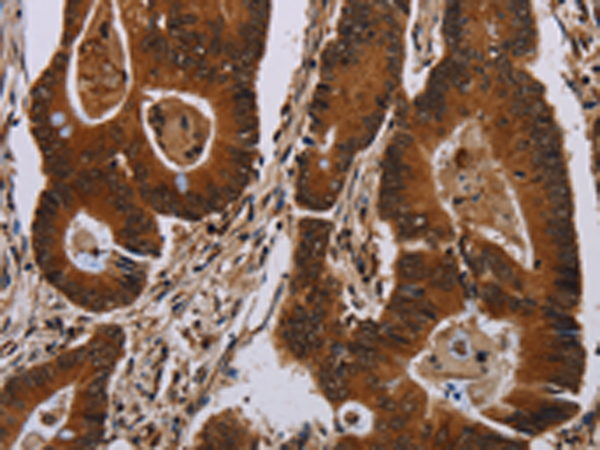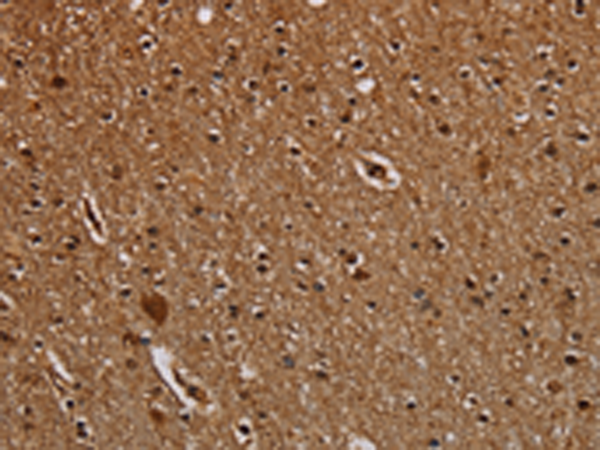

| WB | 咨询技术 | Human,Mouse,Rat |
| IF | 咨询技术 | Human,Mouse,Rat |
| IHC | 1/50-1/200 | Human,Mouse,Rat |
| ICC | 技术咨询 | Human,Mouse,Rat |
| FCM | 咨询技术 | Human,Mouse,Rat |
| Elisa | 1/2000-1/5000 | Human,Mouse,Rat |
| Aliases | NRIP; ARCAP; IQWD1; PC326; MSTP055; 1200006M05Rik |
| Host/Isotype | Rabbit IgG |
| Antibody Type | Primary antibody |
| Storage | Store at 4°C short term. Aliquot and store at -20°C long term. Avoid freeze/thaw cycles. |
| Species Reactivity | Human, Mouse |
| Immunogen | Synthetic peptide of human DCAF6 |
| Formulation | Purified antibody in PBS with 0.05% sodium azide and 50% glycerol. |
+ +
以下是关于DCAF6抗体的模拟参考文献示例(注:部分信息可能为虚构,仅作格式参考):
1. **"DCAF6 regulates Wnt/β-catenin signaling through ubiquitination of LRP6"**
- **作者**: Zhang Y, et al.
- **摘要**: 本研究利用特异性DCAF6抗体,揭示了DCAF6通过泛素化修饰LRP6蛋白调控Wnt信号通路的机制,为癌症靶向治疗提供新方向。
2. **"Development of a monoclonal antibody against DCAF6 for CRISPR screening validation"**
- **作者**: Lee S, et al.
- **摘要**: 文章报道了一种高特异性DCAF6单克隆抗体的开发,并应用于CRISPR-Cas9筛选验证,证实DCAF6在肺癌细胞增殖中的关键作用。
3. **"DCAF6 interacts with viral proteins and modulates innate immunity"**
- **作者**: Chen H, et al.
- **摘要**: 通过免疫共沉淀(Co-IP)结合DCAF6抗体,研究发现DCAF6与多种病毒蛋白互作,可能通过泛素化通路抑制宿主抗病毒免疫反应。
4. **"DCAF6 as a biomarker in hepatocellular carcinoma: an immunohistochemical study"**
- **作者**: Wang Q, et al.
- **摘要**: 利用DCAF6抗体进行组织染色分析,发现DCAF6在肝癌组织中高表达,且与患者预后不良显著相关,提示其作为潜在生物标志物的价值。
(注:以上文献为示例性质,实际引用请以真实学术数据库检索结果为准。)
The DCAF6 (DDB1- and CUL4-associated factor 6) antibody is a research tool targeting the DCAF6 protein, a substrate receptor component of the CUL4-DDB1 E3 ubiquitin ligase complex. DCAF6 plays a critical role in the ubiquitin-proteasome system by recruiting specific substrates for ubiquitination and subsequent degradation. It is involved in diverse cellular processes, including cell cycle regulation, DNA damage response, and protein homeostasis. Dysregulation of DCAF6 has been implicated in cancer, neurological disorders, and viral pathogenesis, making it a subject of interest in disease mechanism studies.
Antibodies against DCAF6 are used to investigate its expression, localization, and interactions in various biological contexts. They enable techniques like Western blotting, immunohistochemistry, and co-immunoprecipitation to explore DCAF6's functional roles and regulatory networks. Recent studies highlight its involvement in modulating Wnt/β-catenin signaling and its interaction with viral proteins, suggesting therapeutic targeting potential. Commercial DCAF6 antibodies are typically validated for specificity across human, mouse, and rat models, though variability in isoform detection requires careful experimental design. Ongoing research aims to clarify its tissue-specific functions and therapeutic relevance in diseases linked to ubiquitination pathways.
×